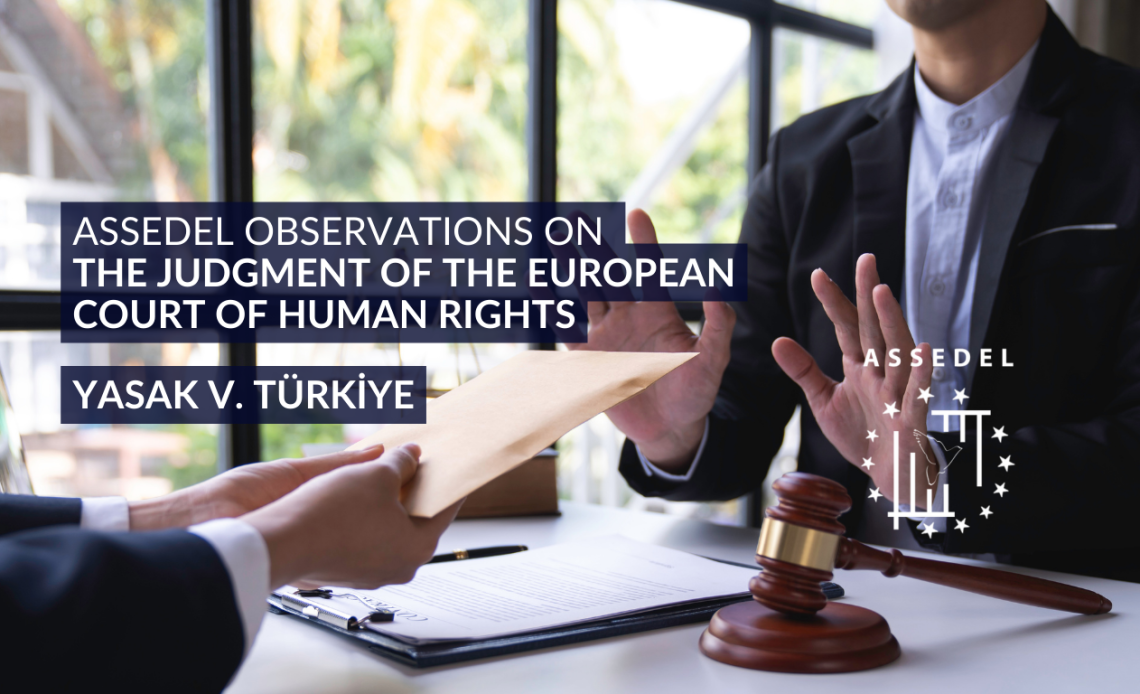Yasak v. Türkiye
This report provides a detailed analysis of the European Court of Human Rights’ (ECtHR) judgment in Yasak v. Türkiye, delivered on 27 August 2024. The case concerns the conviction of Şaban Yasak for his alleged membership in the Gülen Movement. The ECtHR deemed Yasak’s conviction foreseeable despite his limited role as a student coordinator from 2011 to 2014 and his use of a code name. Prepared by ASSEDEL at Yasak’s request, this report argues that the judgment is based on an erroneous factual account and overlooks critical shortcomings in domestic proceedings, casting doubt on the fairness of the trial.
In this judgment, the ECtHR did not examine the applicant’s Article 6 complaints concerning the right to a fair trial. Nevertheless, the Court concluded that there was no violation of Article 7, implicitly assuming the fairness of the domestic proceedings despite the application file containing ample information on the unfairness of the domestic process.
The Yasak case diverges substantially from the Court’s earlier Yalçınkaya judgment. In Yalçınkaya, a violation of Article 7 was found where the conviction was based mainly on the use of the ByLock application, which suggested membership in the Gülen Movement but not a terrorist organization. The report argues that there is no meaningful distinction between Yalçınkaya and Yasak, as the acts attributed to Yasak involved only student coordination within the Gülen Movement and the use of a pseudonym. In Yasak, the Court attached excessive importance to the element of ‘secrecy’ in the Gülen Movement, which, according to the report, should not justify criminal liability. The report contends that Yasak’s conviction lacked the material and mental elements required for a criminal offense, as similarly seen in Yalçınkaya.
The Yalçınkaya judgment affects hundreds of thousands of individuals, but its principles have not been implemented in Türkiye. Despite the similarities, the Second Section’s Chamber reached a conclusion in Yasak that contradicted its prior case law by failing to recognize the absence of any criminal activity in Yasak’s involvement with the Gülen Movement before its designation as a terrorist organization.
Key Points:
- Factual omissions and inaccuracies: Critical discrepancies in witness statements and procedural irregularities were overlooked in the Court’s reasoning.
- Unfair trial proceedings: The domestic trial was marred by limited hearings, virtual participation from prison, and a lack of direct confrontation with witnesses.
- Failure to properly examine Article 6: The ECtHR’s conclusion that Yasak’s trial was fair without thoroughly investigating the right to a fair trial under Article 6 represents a significant flaw in the judgment.
- Inconsistent approach to the unforeseeable application of legal provisions: The judgment diverges from prior rulings, especially the Yalçınkaya judgment, which remains unimplemented despite similar circumstances. The conviction for Yasak’s legal acts should be considered unforeseeable.
Prepared by a commission of distinguished human rights law experts, this report challenges the ECtHR’s examination and conclusions in the Yasak judgment. ASSEDEL calls for a reconsideration of the judgment, which poses a genuine risk of hindering the exercise of liberties under Articles 8, 9, 10, and 11 of the Convention by religious and social groups, with a view to fostering discussion on protecting human rights in politically sensitive cases like Yasak’s.
To read full report, please click here.
Authors and Contributors:
Prof. Antonio Stango: President of the Italian Federation for Human Rights
Prof. Stuart Russell: Monitoring Committee of Attacks on Lawyers, International Association of Peoples Lawyer
Prof. Kemal Şahin: International Human Rights Scholar
Dr. Emre Turkut: International Human Rights Scholar and Legal Consultant
Dr. Yasir Gökçe: Director of the Institute for Diplomacy and Economy
Dr. Ufuk Yeșil: Public Law Scholar
Michael Polak: Barrister, Director of Justice Abroad
Lawyer Juan Carlos Gutiérrez: President of the Human Rights Institute, World Jurist Association
Lawyer Ali Yıldız: Director of the Arrested Lawyers Initiative
Lawyer Hakan Kaplankaya: Legal Expert

